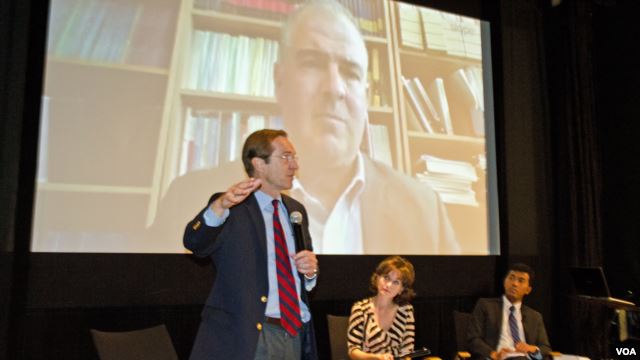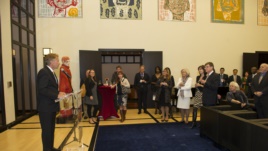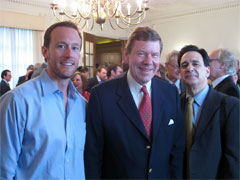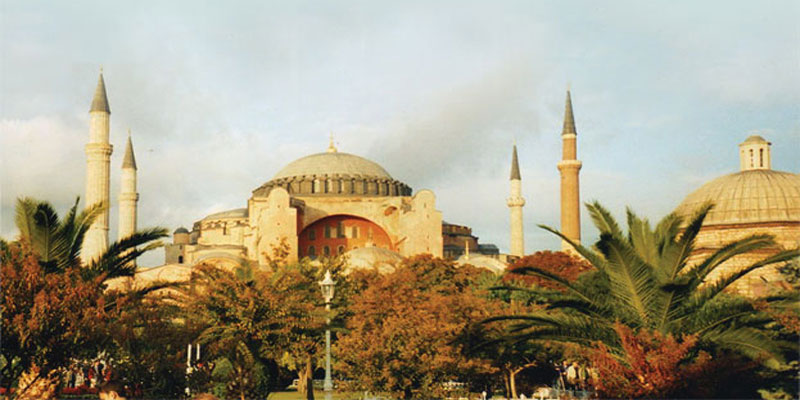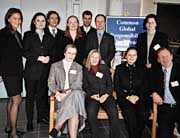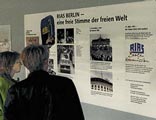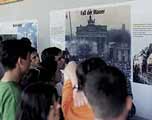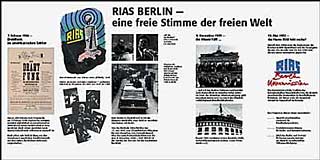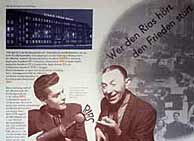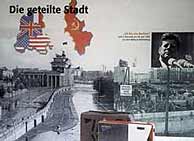Aside from its official programs, the RIAS Berlin Commission supports activities that promote the exchange of views, ideas and help with contacts in transatlantic journalism or inform of the RIAS radio station and its legendary history.
Deutsche Welle / VoA / Goetheinstitut / RIAS Berlin Commission
Panel Discussion “New Media — New Freedom?”
October 25, 2013, Goetheinstitut, Washington, D.C
 Panel Discussion “New Media — New Freedom?”
Panel Discussion “New Media — New Freedom?”October 25, 2013 – Goethe Institute,
812 Seventh Street, NW, Washington, D.C. 20001
VOA Director David Ensor moderating panel discussion on social media at RIAS event in Washington.
German Ambassador Peter Ammon speaks to guests from the RIAS Berlin Commission and RIAS Alumni / photo © Germany.info – by Kaveh Sardari
VOA Director David Ensor moderates panel discussion on social media at VoA-DW-RIAS event in Washington.
Is social media changing the way journalists do their work and communicate with their audience?
That was the subject of a panel discussion, moderated by VOA Director David Ensor, at an event hosted on October 25th by the Goethe Institut, the RIAS Berlin Commission and German broadcaster Deutsche Welle.
Joining Ensor were two of VOA’s social media mavens: Yulia Savchenko, co-host of the Russian Service show Podelis, and Sophat Soeung, the VOA Khmer Service’s new media coordinator.
“A lot of people still think of us as being just on radio, when in fact we are multimedia, which includes television, and the web and especially social media and mobile platforms,” Ensor said. “As VOA Director, I oversee 45 languages services and I like to say we have 45 different marketing strategies.”
Sociologist Theodore Gerber of the University of Wisconsin–Madison, who has studied the impact of social media on the political landscape in Russia, joined the discussion via Skype.
Earlier in the day, award-winning VOA Persian journalist Arash Sigarchi participated in a separate panel “New Media – New Freedom?” which explored the impact social media is having in the democratic developments of a state.
Dr. Heinrich Kreft, Auswärtiges Amt, Berlin and member of the RIAS Berlin Commission, Sherry Al-Hayek, Lindsay Hofmann and Zeyno Üstün completed this first panel on the growing importance of social media for democratic developments in many parts of the world, which was hosted by DW radio editor-in-chief Ute Schaeffer.
Following the two panel discussions, participants took part in a reception at the residence of German Ambassador Peter Ammon. RIAS chairman Erik Bettermann, IBB Director Dick Lobo, a member of the RIAS Berlin Commission Board, and former Ambassador Robert Kimmitt were also spotted mingling with the crowd of German and American journalists.
Since 1992, the RIAS Berlin Commission has been working to increase German-American understanding in the field of broadcasting and has hosted many VOA reporters on its fellowship program. Panelist Sophat Soeung recently returned from a two-week exchange in Germany.
Program
2:00 p.m.
Welcome and introduction by Dr. hc. Erik Bettermann,
chairman of the RIAS Berlin Commission, former Director Deutsche Welle
2:30 p.m. – 4:00 p.m.
First panel discussion “New Media — New Freedom?”
Host: Ute Schaeffer, editor-in-chief, DW radio, Bonn.
Panelists: Dr. Heinrich Kreft, Auswärtiges Amt, Berlin, Member of the RIAS Berlin Commission,
Sherry Al-Hayek, Arash Sigarchi, Lindsay Hofmann, Zeyno Üstün.
4:00 – 4:30 p.m.
Coffee break
4:30 – 6:00 p.m.
Second panel discussion “How Social Media Changes Journalism”.
Host: David Ensor, Director VoA
Panelists: Yulia Savchenko, Host of VoA Russian show “Podelis”, Prof. Theodore P. Gerber, (by Skype) University of Wisconsin-Madison, Sophat Soeung, New Media Coordinator/Reporter, VoA Khmer Service
RIAS workshop at the Deutsche Welle Global Media Forum
Bonn, Germany, June 5, 2009
A panel discussion with Miguel Marquez, Dr. Jochen Thies, Dr. Michael Groth, Jon Ebinger and David Patrician, in Bonn, Germany, at the World Conference Center, the former parliamentry assembly hall.
German and American journalists discussed how TV and the electronic media covers the issues of terrorism. What are the differences, what are the similarities? Has anything changed since September 11, 2001, when a shocked US asked “why do they hate us so much?” and the US media promised to provide more background information on the roots and causes for terrorism? Is the German media doing enough to live up to the challenges of analysing the reasons for this new global threat? What can the media do at home and abroad to fight terrorism and a looming global division along religious lines?
Jon Ebinger (jon@RTNDF.org) facilitates the RIAS program in Washington, and works with the Radio and Television News Directors Foundation (RTNDF) on journalism education and training programs. He formerly was a producer with the program Nightline at ABC News, and has been involved with news coverage and programs for National Public Radio, the National Geographic Channel, and the BBC. Among other projects, he produces semi-annual workshops for journalists and public officials entitled ‘News & Terrorism: Communicating in a Crisis.
Michael Groth (Michael.Groth@dradio.de) is a correspondent with the capital bureau of DeutschlandRadio. He specializes in security issues, most of all Afghanistan and has made regular trips to the region. He got his Ph.D. from the University of Iowa in 1983, and worked for four years as junior editor for “Frankfurter Allgemeine Zeitung”. Since 1988 he is political editor at DeutschlandRadio, with two-time-assignments to its capital bureau in Berlin, and with regular trips to the U.S.
Miguel Marquez (Miguel.Marquez@ABC.com) started his career at KSAZ-TV in Phoenix but quickly moved on to CNN Atlanta where he became the war desk anchor during the Iraq invasion. Since joining ABC News in May 2005, Marquez has reported extensively on the Iraq War. He was nominated for an Emmy Award for his part in reporting that al Qaeda terrorist Abu Musab Al Zarqawi had been killed. He also reported from Germany on a U.S. investigation into a terror plot there.
David Patrician (patrician_david@yahoo.com) used to work as VOA (Voice of America) journalist in Washington DC, before he came to Germany on a RIAS study program and a subsequent one year Bosch Fellowship. He has also worked for Deutsche Welle (with trips to Afghanistan) and WDR in the past 2 years. David combines knowledge of the U.S. and German media scene with profound experience in South Korea, where he went to university.
Dr. Jochen Thies (Jochen.Thies@dradio.de) studied political science and German history and has published a number of books on internatinal relations and German history, among them the critically acclaimed “The Dohnanyis”, a German family’s fight against dictatorship and for democracy. Today Dr. Jochen Thies works as special correspondent in the editorial office for Deutschlandradio Berlin.
More information at dw-gmf.de
Round Table USA: Societies in Transition — Adjusting to Changing Global Environments
San Francisco, June 26–29, 2008
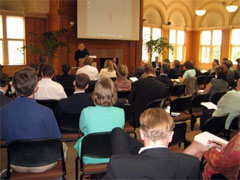
The first night of the reunion at the German consulate in San Francisco. RIAS Fellows Brent Geoff and Frank Ucciardo are pictured with (center) Dr. Christian Stocks, the German consul general from Los Angeles (a big RIAS fan and supporter) who came up from Los Angeles to participate in the discussions.
Another joint transatlantic Alumni Conference was held in San Francisco and Stanford, Palo Alto, USA, from June 26–29, 2008. The Round Table USA was initiated in 1998 by the Robert Bosch Foundation and the Institute for Foreign Relations (ifa), and gathers some 30 German and bilateral institutions and foundations that are engaged in the transatlantic exchange. The fourth time brought together alumni of the Round Table institutions from both sides of the Atlantic in order to strengthen transatlantic networks and to discuss issues of common interest
The topic was ‘Societies in Transition — Adjusting to Changing Global Environments.’ Discussed was the sustainability of our societies in times of global change. Among the issues on the agenda were changes in values and the ‘glue’ that holds our societies together; we talked about migration, mobility and the nation state; about individual and structural social mobility, i.e. openness and permeability of social structures; about the question of social cohesion and the potential to adjust to rising inequalities, also about transnational politics and global responsibility with regard to energy security and climate change — the two twin challenges of the 21st century, and about the dichotomy between science and religion in our societies.
As in previous Alumni Conferences, there were plenary sessions with high-ranking keynote speakers and parallel working group sessions where the main themes in greater detail were discussed and where alumni as speakers or moderators became involved. Some 150 participants from both sides of the Atlantic took part.
Berlin-Ankara/Istanbul: Germany in an International Context
October 8–16, 2005
Migration, Integration, Social Change — Germany in an international context



RIAS Fellows in Istanbul; street interviews; with Dr. Wolfgang Schäuble, German minister of the interior; and with Dr. Wolf-Ruthart Born, German Ambassador to Turkey.
On behalf of Round Table USA, the Fulbright Commission, in cooperation with the RIAS Berlin Commission, Atlantik-Brücke, Dräger Foundation, German Marshall Fund, ifa, IJP, Körber Foundation and Bosch Foundation, invited young journalists to the alumni conference “Berlin Re-visited: Migration, Integration, Social Change — Germany in an international context” in Berlin and Ankara/Istanbul.
During their initial three days in Berlin, participants met with leading politicians and diplomats at the German Chancellery, the Bundestag and embassies, as well as high level representatives of the media and the private sector. During the following three day visit to Turkey, meetings with high ranking officials, politicians, entrepreneurs and key players in Turkish public life were scheduled in both Ankara and Istanbul.
Comments of American participants
From German-Turkish relations to Turkey’s bid for EU membership, I felt every step of the way was a learning experience that allowed me to focus on an issue that I don’t normally get the opportunity to focus on in my daily duties. It is discussions like these that foster a better understanding of the issues from all perspectives. The speakers were relevant, candid, engaging and focused. The trip to Turkey was also a tremendous part of the experience — it set the backdrop for a far deeper understanding of the topics we were tackling during the daily sessions.
Suzanne Simons
The entire experience was a wonderful education on the future of Turkey and its relations with the EU and Germany. Such seminars really add to our reporting skills and awareness of larger issues outside the United States.
Susan Rucci
AICGS Conference 2005: Media and Politics in German-American Relations
Georgetown University, Washington, D.C.
- Blogs are simple, fast, democratic, and much cheaper than traditional publishing, but unlikely to supplant traditional media. Blogs are not as politically influential in Germany as in the U.S.
- The mix of opinion and fact is growing in German and U.S. news reporting. Due to around-the-clock news and the speed in which news is gathered and reported, journalists increasingly rely on secondary sources, the internet, and pre-packaged pieces.
- Entertainment, or “infotainment,” is growing in both countries. The fragmentation of the media landscape and resulting financial pressures led to a “softening” of news reporting through infusions of entertainment to keep the public’s attention.
- German broadcasting has acquired a more “American” look, but the longer impact of commercialization remains unclear. The commitment to a strong publicly supported broadcasting network is unlikely to diminish. This keeps Germany apart from the United States.
AICGS Conference 2004: The Media in German-American Relations
Georgetown University, Washington, D.C.
The conference brought together print and broadcast journalists, editors and producers, as well as policy analysts and scholars, to examine how the events leading up to, during, and following the Iraq war were portrayed in the media in Germany and the United States, and who and what forces shaped U.S. and German reporting on the conflict. Concluding observations focused on the question of whether the differences in coverage are a reflection of the fact that German media is only now beginning to adapt to some of global trends in journalism that already reshaped the American media landscape and U.S. reporting, or whether they are an indication of a growing values and interest gap in German-American relations.
The conference began with content analyses of broadcast and print media by Roland Schatz, CEO of Media Tenor, and S. Robert Lichter, Co-Director of the Center for Media and Public Affairs. The analyses revealed sharp differences between the German and U.S. media both in emphases and choice of topics presented. Broadly, coverage in the United States and Germany tended to support the position of the respective governments. The predominant tone in the American media was strongly supportive of the Bush administration, while German news reporting overwhelmingly backed the Schröder government’s position on Iraq. U.S. news networks and papers paid scant attention to anti-war protests, while demonstrations against the war made up a larger percentage of stories that appeared in German media outlets. One analysis showed that news stories in Germany about the United States were fairly balanced in 2001-2002, but that by 2003 the coverage generally was far more negative. A study of broadcast coverage of the big three U.S. networks found a real mix in perspectives on the war (though ABC was more balanced in their reporting than NBC or CBS), while Fox News was decidedly pro-Bush. Viewers listening to the Brit Hume program on the Fox News channel, for example, heard three times as many positive statements about the Bush administration and their position on Iraq than negative statements. The presentations were followed by a panel discussion among print and television news reporters, editors and producers of why the coverage of the war in the United States and Germany was so different. Panelists included Steve Erlanger of The New York Times, Jamie McIntyre, Pentagon correspondent for CNN, Klaus-Dieter Frankenberger of the Frankfurter Allgemeine Zeitung, and Werner Sonne of the German ARD network. A luncheon discussion with Marvin Kalb of the Joan Shorenstein Center at Harvard University, Michael Mosettig of the Newshour with Jim Lehrer, Arnd Henze of WDR-TV in Köln, Christine Kolmar of N-TV in Berlin, and Stefan Theil of Newsweek in Berlin continued the debate on the sources of differences in the German and American media.
One of the questions raised was whether the differences are rooted in disparate approaches to reporting and editorial traditions, or whether there are deeper social, political or cultural explanations. As is often the case, the answer was a little bit of both. Germany’s own experience with war, skepticism about the utility of the use of force, and the strong support for international law and institutions among its populace raised emotions and ultimately opposition to a war in Iraq, which was reflected in some media reporting on the war. Significantly for some, the disagreement was a reflection of the strategic disconnect between the United States and Germany and Europe after the end of the Cold War. But other factors were related to the business of news. Whether the public was supportive or critical of the Iraq war did, at times, shape reporting as well as editing, since reporters — via e-mail and phone calls — felt pressure to be either patriotic or critical and editors made decisions based on what they believed their local audience was interested in. But other factors also influenced reporting: the impact of technology and the internet; the advent of “24/7” news; the pressures of competition and ratings; and the sheer volume of information to be processed. News sources often were not cited and, in television reporting, video clips were hastily constructed and broadcast to fill the round-the-clock needs of television news with little time taken to place the information within a given context.
But the audience was also reminded that people are strongly influenced by their own pre-existing views and beliefs. In Germany, the Bush administration’s previous actions — its refusal to sign the Kyoto treaty, its opposition to the International Criminal Court, its dismissal of the United Nations — had helped to create a mood in the German public that made it predisposed to critical of the current U.S. administration’s handling of international issues. Such impressions, once created both through the news and other sources, are not easily changed, and there are few self-corrective mechanisms in the media to rebalance the reporting. In the end, some concluded, the American media did a bad job of covering why Europeans were so opposed to the U.S. position, and the German media did a poor job of explaining why Americans were more supportive of military engagement in Iraq.
The final panel focused on the role and responsibility of the media in shaping mutual perceptions that can influence policy, with comments by Rüdiger Lentz of Deutsche Welle in Washington, D.C., Ralph Begleiter, a former CNN correspondent now teaching at the University of Delaware, and Robert von Rimscha of Der Tagesspiegel in Berlin. Panelists were asked to consider whether current media reporting on transatlantic differences helps to sustain conflict, complicating efforts to pursue pragmatic cooperation in the near term and to reconstruct an effective, collaborative transatlantic partnership in the longer term. Several journalists agreed that while the media is part of the problem, they are not the source or instigator.
Much of the shift in mutual perceptions across the Atlantic is a result of larger forces that arose out of the events of 1989-90, and particularly for the United States, out of 9/11. One participant argued that much of the media reporting and commentary over the last year and a half should be seen within the context of an ongoing process of identity formation both in the United States and Germany. The United States is a global political and military power, and in the wake of the 9/11 terrorist attacks Americans have responded to global threats to their own security. Germany has had to deal with the consequences of its own adjusted identity, not just with a “German” identity in the wake of unification but a European identity as well, as the European Union prepares to expand its membership to ten more states.
Within this context, critical reporting on the United States may help Europe to define itself in contradistinction to the United States, facilitating European efforts to forge a new, collective European identity. The result is what many feel is an increase in anti-Americanism in Europe. In Germany, critical reporting on the United States is also linked to an ongoing domestic debate about internal structural reform in response to the pressures of economic globalization. On the one hand, severe budget deficits and the consequences of an aging population are forcing the German government to implement a system of reform — in health care, education, pensions — that places more of the burden on the individual. But Germans are proud of their social welfare state and are highly critical of conditions in the United States, where the benefits are so unevenly distributed. In the public debate, the looming loss of social benefits and proposals to streamline the social welfare system are equated in the minds of many with the “Americanization” of German society. In this sense, negative reporting and commentary on the United States is instrumentalized in a domestic political struggle over economic reform.
But external dynamics have also played a critical role in reshaping media reporting on the both sides of the Atlantic, with significant if unintended consequences for German-American relations. The effects of doing business in the news media — of fierce competition for ratings, of media outlets being bought by large corporations who expect news divisions to generate profits, of the technological impact of twenty-four hour news coverage and the fragmentation of news sources and outlets — all of this has changed the way news is presented. Although the trends may be further advanced in the United States, some argued, Germany is not far behind. The trends in today’s journalism converge with the other economic, political, and social trends in Germany and the United States to create an environment that has contributed to the view that the media is part of the problem.
What can be done? Among the solutions advanced to address these trends: Exchanges between reporters, editors, and producers should be expanded and intensified. More international news coverage is needed, despite the often-heard argument that the public is uninterested in foreign affairs. News outlets should also contemplate how they could change outdated broadcast formats to better reflect the realities of life in America today, where not all people have a twenty-minute commute and come home to dinner on the table and the evening news at 6:00pm. Finally, journalists must make strict distinctions between news reporting and commentary to avoid what has become a flood of “opinion journalism”, and they must again take up their responsibility to serve the public by maintaining a respectful but critical distance to the corridors of power and the offices of authority.
Additional support for the conference was provided by the Thyssen Foundation, the Halle Institute at Emory University, Deutsche Welle, the Elfriede Dräger Memorial Foundation and the RIAS Berlin Commission.
Alumni Conference: Common Global Responsibility
Georgetown University, Washington DC, November 6–9, 2003
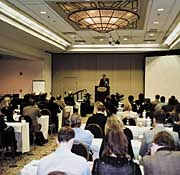
November 6 to 9 the Institute for Foreign Relations (IFA), Stuttgart, organized the German-American Round Table Seminar 2003, together with other transatlantic organizations: Atlantikbrücke, Fulbright Commission, DAAD, Dräger Stiftung, German Marshall Fund, IJP-Burns Fellowship, Körber Stiftung, Konrad Adenauer Stiftung, RIAS Berlin Commission and Robert Bosch Stiftung.
Approximately 100 alumni of these organizations participated in this conference on Global Responsibilities and its four workshops: security issues, energy/environment, politics/media and migration/integration.
The RIAS Berlin Commission was represented at the Georgetown University Conference Center by Fellows Ines Arland, Birgit Becker, Ulrich Brümmer, Yvette Gerner, Mark Gillespie, Ute Kindler, Elke Labisch, Peter Mücke, Lennart Reip, Barbara Scherle, Ursula Wissemann and Candace Williams.
For more information go to: Runder Tisch USA
Alumni Conference Berlin-Warsaw on the Expansion of the EU to the East
2002
Warschau, 12–19 Januar 2002
Organized by the Institute for Foreign Cultural Relations, German-American organizations such as the RIAS Berlin Commission, Alexander von Humboldt Foundation, IJP, Atlantik-Brücke, Fulbright Commission, Körber Foundation and Robert Bosch Foundation invited more than sixty former programme participants to a one-week alumni seminar on EU enlargement in Berlin and Warsaw. The participants, including twelve RIAS Fellows, were offered a top-class program including appointments with German President Johannes Rau, German Chancellor Gerhard Schröder, German Foreign Minister Joschka Fischer and Polish Prime Minister Liszek Miller.
RIAS in the Allied Museum Berlin
1998
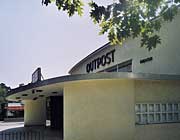
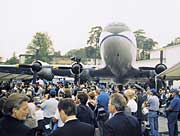
The visiting US journalists of the 1998 summer program of the RIAS Berlin Commission were guests at the opening of the Allied Museum on June 27, 1998.
An audio station with four individual headphones was sponsored by the Commission to enable visitors of the Allied Museum to listen to reports and program samples of RIAS Berlin from the years 1947 to 1949.
Brian Zumhagen and Gail Tzemach, visiting US journalists of the 1998 summer program of the RIAS Berlin Commission meet Minister of Defense of the Federal Republik of Germany Volker Rühe.
Peter Kendall and Bill Skane, members of the jury of the RIAS Berlin Commission, visit the Allied Museum Berlin and listen to historic RIAS Berlin programs.
Media Exhibition at the Berlin TV Tower
1997/1998

From 1997 to 1998 a comprehensive exhibition on the history of Berlin as a media metropolis could be seen around the TV tower at Alexanderplatz.
Of course, this overview had to include RIAS Berlin and the RIAS Berlin Commission.
What Methods are Permitted in the Ratings War?
Panel discussion on the 5th anniversary of the RIAS Berlin Commission,
Amerika Haus Berlin, 1997
May 24th, 1997, Amerika Haus Berlin
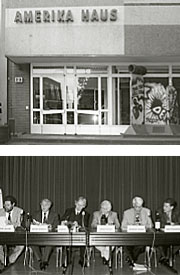
Participants in the panel discussion:
Ernst Elitz, Director of DeutschlandRadio
Peter Laufer, US radio and TV journalist,
author of “Inside Talk Radio — America’s Voice or just Hot Air?”
Matt Marshall, correspondent of Wall Street Journal, Bonn
Werner Sonne, former correspondent of ARD in Washington
Dieter Weirich, Director of Deutsche Welle
Host: Robert L. Earle, Minister Counselor for Public Affairs
Embassy of the United States of America in Germany
The struggle for ratings is getting tougher. Falsified TV features have been broadcast in Germany several times already. In the United States, the news also has to be entertaining; weather, crime and traffic are the staples of most local newscasts. In contrast to Germany, reenactments, the use of hidden cameras, and the private lives of politicians are not considered taboo. Are German journalists simply too timid — “pussycats rather than tigers,” as Wall Street Journal correspondent Matt Marshall wrote in Die Zeit?
Robert L. Earle:
We have framed our topic this morning within the context of the ratings war, but I think it goes beyond ratings, it goes to the core of journalism, as it is practiced when you are sitting with the source, or someone you are interviewing, and you are making decisions on the spot about how to probe or flatter or frighten or lead, or whatever it is to try to get at the real story as best as you can. Are US journalists tigers and the German journalists pussycats, or in German “Bettvorleger”, as Matt Marshall recently wrote in an article for the German weekly paper Die Zeit?
Matt Marshall:
There is a difference between the press and TV. But I think despite these differences this thesis can be transferred, can be generalized to a certain degree to include television. I think it basically goes back to the way the two different professions developed in Germany and in the USA. This is clear when one sees how much the government is involved in the media in Germany. You have a very large degree of state intervention everywhere in Germany. There is less intervention in the United States. Whether it be newspapers or television you had heavy political involvement and this political involvement has continued. I think this thesis can be generalized because there are still many differences in the way American and German journalists go about reporting, especially in Bonn but also in investigative journalism, because of this tradition of having the state take care of so much of people’s lives. There is a tradition in the United States of having the press perform an “ersatz” public function. In Germany people expect the state to assume this regulatory function.
Werner Sonne:
Not only did I work in the US for 81/2 years, I also spent 14 years of my life in Bonn. As a young man, I started there as a “tiger”, and — in my own judgment — I did not end up as a “pussycat”. When I listen to this thesis, I must say that this does not reflect my own experience. On the contrary, as a former Bonn correspondent, I think that the German press — also in comparison with the American press – does fulfill its control function, and has caused more politicians, including Franz-Josef Strauß and Jürgen Möllemann, to resign than the American press. I should like to stress that the American press is suffering from a kind of “Post-Watergate Syndrome”. Since the majority of the American press slept through Watergate (only the Washington Post actually led to the impeachment of Richard Nixon with its relentless research), Washington journalists are always keen to dig up new scandals. It is my own impression that they sometimes overdo it. They are afraid to miss the next Watergate story and for many years have been hunting after Whitewater, particularly targeting Bill Clinton. It is really not my intention to depict Bill Clinton as a faultless hero. He definitely has shown a lot of weaknesses. But what I have seen particularly in the past few years, regarding attempts to accuse him of almost anything, convinced me of the fact that at least the White House correspondents suffer from this “Post-Watergate Syndrome” without having achieved much so far. This also holds true for the election campaign and the rightly criticized campaign contribution scandals. Again, people targeted Bill Clinton. I understand that, because he is the President, but what was overlooked was that his opponents, the Republicans, had received twice as much in campaign contributions, i.e. 400 million dollars, whereas the Democrats were satisfied with only 200 million dollars.
Particularly in the past few months, I have found it striking that the U.S. press is quite colorblind in this area. This is a surprise, as one usually accuses the US press of being a leftist, liberal press siding with the Democrats. One has to have a more inclusive view regarding American journalists and nobody who has ever traveled across the United States will challenge this statement. There are a number of quality newspapers on the East coast, as well as on the West coast, but in the middle of the country the American press is not really that exciting when it comes to critical reporting. Regarding quality standards, our provincial press does not have to fear any comparison with the American press.
Robert L. Earle:
Do you investigate and report differently in Washington than you would if you were working in Bonn?
Werner Sonne:
No, I do not think so. I believe that I actually fulfill the function of a critical watchdog, a function we should and must fulfill. In Bonn an ARD correspondent is closer to events than he would be in Washington, not in the sense of being a “pussycat” but in the sense of critical reporting. I should like to give you an example of this: If you saw the interview by the WDR editor-in-chief for television with Federal Chancellor Helmut Kohl in April 1997 and compare this with the farewell interviews David Brinkley, one of the senior reporters in American television, carried out first with Bob Dole and then with Bill Clinton one day before and one day after the presidential elections in the US, you actually almost fell asleep during David Brinkley’s interviews, whereas the interview with the German Chancellor was quite lively, to put it mildly.
Ernst Elitz:
The yardstick for quality in journalism cannot be how many politicians were forced to step down, but rather the intensity, quality, and accuracy of research. The second important point I should like to mention is political influence. What is more harmful for journalism: too much political influence or too much economic influence? Politics is controlled by the public, whereas the economy and industry are not publicly controlled. And in our present situation, when publishing houses not only own newspapers but also operate radio and television stations — with a market share limited to 30% — they can of course use the media to further their own economic interests. The best, and at the same time, worst example does not come from Germany.
We all know that Murdoch removed a BBC channel from his satellite, because the BBC had been reporting critically about the human rights situation in China. Murdoch, however, wanted to do business in China — media business — and he did not like this kind of reporting. He felt it threatened his activities. He considered the freedom of the press less important than his economic interests. If he had focused on political considerations, this would not have happened. In a system under public law, which is controlled by representatives of the public, including politicians, I think it is more likely that the quality of journalism is ensured than in a system where journalism is used and controlled only by economic interests.
Dieter Weirich:
First of all, the German side, of course, rejects with unanimous indignation Matt Marshall’s opinion that we are “pussycats”. Let us focus on the question of whether there are differences between Anglo-Saxon journalism and Teutonic journalism. Here the question whether one forces a politician to step down is, of course, not the main consideration. But it is indeed clear that investigative journalism can cause politicians to resign from office.
I disagree somewhat with my colleague Mr. Elitz, because industry and politics in Germany have actually entered into a very close relationship with each other. Just look at the development of competition in telecommunications and also in mass communications. There are two federal states in Germany — one governed by a conservative, one by a socialist majority — whose regulatory policy is “If you hit my Bertelsmann, I’ll beat up your Kirch” (Bavaria is the home of Kirch Media Group, North-Rhine Westfalia is the base of Bertelsmann). Against this background, one must say, there are political interests and there is political control!
Let me speak to the point of the issue: I believe that in the two countries there are different tendencies and trends. I agree with Matt Marshall’s criticism that in Germany there is not enough target-oriented, investigative journalism. And this is simply due to the fact that too few of the media have investigative teams which can work on a story for several weeks. And there is also a difference regarding the image of the media as an instrument for information. In Germany television is still considered an information tool, and I think this overestimates its role. An American professor for communications once told me, “Television has to be fun; intelligent people read newspapers” I believe that there is a difference regarding the self-image of journalists in America and in Germany. Journalists in Germany definitely do just as good a job and produce just as much quality, but the difference is that German journalists consider themselves part of the overall political scene which is obsessed with harmony. Everybody functions in his or her own category, either the conservative or the liberal one. That is why in some press conferences you get the impression that journalists are “ersatz” politicians rather than critical investigators. The longer a journalist has been in the business, the stronger his or her chameleon-like adaptation, although the situation was worse in the 1970s. There is definitely a change today.
A final reason why I do not like to glorify Anglo-American journalism in general has to do with the terrible examples of biased, “peephole” journalism, not so much inpolitical reporting but in coverage of the private lives of people. This applies to Great Britain, as well as to the US: Competition in this area is constantly increasing, and of course nobody can seriously defend this peephole journalism. I am referring to the child-abuse campaign against Woody Allen and the “Royal Peep Show” one can watch in Great Britain every day including the subsequent indignation of a prudish public. In this context, we are experiencing a high degree of hypocrisy on the part of the media, and that is why — with a self-critical look at the German media — I would not want to agree with the statement that in order to change the German pussycats into tigers, we only have to follow the American example.
Peter Laufer:
When you look at our two cultures and our two nations and our two countries, if you want to find a doormat you can find a doormat here and you can find a doormat in America. If you want to find tigers, they are on both sides of the water. For me it is of greater concern how talk radio and the tabloid press are pushing the so-called mainstream press. This is something we have seen since the O.J. Simpson trial, and before that the William Kennedy Smith rape charge. We should be much more concerned about results of the ratings war and circulation war, and about what we are doing in terms of content, rather than whether or not we are pussycats or tigers, because we are both.
Robert L. Earle:
Is this a problem with German competitiveness at the moment? You have got all this regulated state-subsidized electronic mass media! Whereas in the U.S. or other countries people live and die by the marketplace and have to be competitive, have to dig in!
Werner Sonne:
It is not secret that ratings are the holy cow in America, as well as in Germany, and this also applies to the public broadcasting system. I think this is not a good develment, particularly in Germany, when it comes to assuring the quality of journalism. You all know that for local news in America the most important principle is “When it bleeds, it leads,” i.e. bloodshed guarantees good ratings. American television today is produced under the influence of focus groups, i.e. a selection of citizens is asked what they would like to see, and in most cases it’s soft news and crime. So this is what the local stations concentrate on. This trend is becoming more obvious, and American journalists also deplore it. So the brutal editorial focus is exclusively on market shares and ratings. Unfortunately, this virus is also spreading to the national media in America, where “soft news” is becoming more prevalent. In the area of “hard news”, the amount of foreign policy reporting has decreased by over 50% in the past seven to eight years. Of course, in Germany, too, there is a trend to focus on “soft news” to survive the merciless competition.
Robert L. Earle:
Mr. Elitz, to what extent do ratings affect you and to what extent do ratings affect your journalists?
Ernst Elitz:
Being the only public national radio station in Germany, DeutschlandRadio is in a unique situation. Because we are financed by listeners’ fees we are free of commercials, and do not have to struggle for market share and ratings at any cost. We are not subject to this kind of economic influence. But, of course, we have to try to increase the market share of our sophisticated radio and television programs. A journalist focusing on political information — and this is what I consider my own task — of course wants to inform many people, because this is the best way to trigger processes of maturation in a democratic society. To generate ratings at any cost for economic reasons is something I consider negative because it reduces the quality of journalism. Of course, journalists who are under eco-nomic pressure to achieve high ratings will become the pussycats of a sensation-seeking audience. It is not good to be the pussycat of politicians, but it is equally bad for a journalist to be the pussycat of the sensational-hungry audience either. For me, a journalist is an agent supplying information which enables the audience to form opinions.
When talking with colleagues who work for highly investigative magazines, they tell me that in the past, when market pressure and competition were not yet so great, they were able to research a story until it was 110% sure. Then they would publish it although it might have taken a week or two weeks to complete. Today, competition is so tough that they publish a story when it is only 98% or 90% sure, because they know that the competition does not adhere to their previous high standards. They also know that with subtle wording, speculation, suspicions, and rumors they can design a story in a way that makes any litigation unlikely. For readers and viewers, rumors are of course much more fascinating and interesting than the truth. The truth is more sober than its beautiful sister, imagination. And that is why rumors and suspicions generate much larger market shares than serious information. So I am concerned that, for economic reasons, journalists might become the pussycats of a sensation-seeking audience.
Matt Marshall:
I agree with the emphasis on the problem of having people wanting violent news and the media responding by giving it to them. However I don’t think we can get away from the need for personal responsibility, on the part of the audience as well as journalists. There are some problems, but today the electronic media show increasing self control. There are two media critics on all large newspapers and there is a large discussion in the opinion section of newspapers on the role of media in society.
Coming back to investigative journalism: The point is that the Los Angeles Times had six journalists at its disposal to cover the campaign contribution scandal that broke out this year. This newspaper from Los Angeles, with 30 people in Washington, uncovered and basically set the agenda on the campaign contributions story. There is no such assignment of staff in Germany to Bonn, although Der Spiegel is an exception. I think only Der Spiegel does very strong investigative reporting.
There is also this fight in the German press and television to have access, to sit on the plane with Chancellor Kohl and to get the interview. And they will do anything to get this interview. I think they tend to reduce their criticism in order to maintain that access. Most of us have probably heard about Der Spiegel, about how the correspondent travelling with Kohl to Brunei was not allowed to sit on the plane. He could not participate in some of the activities when he got to Brunei, because he was shut out by the spokesperson of Kohl.This is because Der Spiegel has an antagonistic relationship with Kohl. I don’t think that would ever happen in the US. I think that my colleague Werner Sonne is in the minority and that the majority of German journalists that I have talked to believe that there is what they call “Absprachekultur” there is an agreement by government officials to allow them into background discussionsas long as the journalists don’t go too far. What we found in the case of Süddeutsche Zeitung is that you have the correspondent in Munich writing the very critical articles and the correspondent in Bonn, more interested in maintaining access, not writing extremely critical articles
Peter Laufer:
Don’t you think, de facto, that that happens in America also?
Matt Marshall:
I don’t think so, because there is just no tradition of shutting out someone because they have written something. I think this is a reflection of the German tradition of deference to authority that does not exist in the U.S. It is not built into us to want to say a positive word about somebody. It is seen as weak, because of the tradition we have developed to be on the side of the public, to fend off government. That is a very strong part of our tradition. In Germany, that doesn’t exist. Here you have a starting point of trust.
Ernst Elitz:
It has already become a tradition that interviews of Bonn-based politicians are not carried out by our Bonn correspondents but by journalists based at the studio in Cologne. These are younger colleagues who remain healthily aloof from what is going on in the capital and in politics. They will definitely ask questions which are different from those asked by a journalists who wants to have access to the Chancellery again the next morning. I think this is a good division of labor.
Werner Sonne:
You might have noticed already that Matt and I have quite different views of things, and I should like to explain this in more detail, so that you do not go home today with the impression that American journalism is so critical and the journalists in Bonn are really only these frequently quoted pussycats. I want to be self-critical and say that of course there was a tradition in German journalism which lasted 20 years and which Mr. Weirich briefly mentioned, i.e. the “confessing journalism” which was somewhat the legacy of the 1968 movement. I dissociated myself from this then and I still do so today. Thank God, this trend is subsiding — and it has never existed in American journalism, which I consider a positive feature. I am very pleased to see that a younger generation of German journalists is now emerging who do not follow this trend.
Regarding the fact that American journalism is allegedly free of ideologies, I should say that when looking at the time of the Cold War, and even looking at the situation today, I have to ask myself what American reporting about American foreign policy was like. For example in Latin America where massive American interests were at stake and where Ameri-can politicians had been turning a blind eye for decades, this even had an impact on the New York Times. There were instructions that terrible violations of human rights were simply to be ignored. Today I wonder about the American sphere of influence in the Middle East, in Saudi Arabia, in other Arab states. What about democracy and human rights in Kuwait, where America waged a war? Which American journalist actually makes the effort to critically analyze this? There has to be a reason behind all this, and to simply maintain that there is no ideology involved is quite a daring statement.
Peter Laufer:
I think it is important for me as an American journalist to point out that we have given a lot of politicians free rides. This happened with Ronald Reagan for 16 years including his governorship of California. It was pretty ludicrous; we just left him alone. The current nonsensical situation is to give most favored nation status to China, while we act as if Cuba is about to take over the lower 48. We can make a long list requiring self-criticism, so I just think that we as Americans should be cautious when we attack our German colleagues and shouldn’t paint ourselves as being all rosy.
George Lewinski (Market Place, Los Angeles):
Have journalists somehow lost contact with the people they are talking to, because of their privileges, better education, higher salaries?
Prof. Lutz Erbring (FU Berlin):
During this discussion, the terms audiences, ratings, and market shares have been used with a somewhat negative connotation. The audience is the public, the same people who vote on election day, and I believe what we are overlooking in our self-definition here in Germany is that journalism is a service industry and not an information industry.
Werner Sonne:
I do feel privileged being able to participate on behalf of our audience in very many exciting events and to report about them. This is my service function. However, it should not reduce my distance from these events, and it should not make me forget that I have to fulfill this service function. But it is also our task to report about what is important and what is relevant with an interest in enlightening our audience. If we had a populist attitude and only produced what people want to see, then we would actually destroy journalism.
Dieter Weirich:
If somebody has the correct atti-tude and self-definition as a journalist, it is a good thing if he or she has a better education than listeners or readers, because one’s most important task as a service provider is to explain often complicated social and political facts and to spare the reader or spectator one’s own opinion. The real service is to research as many facts as possible so the audience can get a comprehensive view of the situation — this is the true art of journalism. All this debate about journalism as a service function is, of course, also due to the self-image of the Germans, their concept of culture, and their concept of freedom. But it also has to do with the fact that we seem to have deleted the word “customer” from our dictionaries. Now the word “customer” has returned and even includes the radio and TV audience. So a new concept of service will emerge, and here I do agree with Mr. Sonne.
It cannot be the task of a public station to follow every popular fashion. Public stations particularly should not adjust to these fashions because they have a clear mandate laid down by law. If a public station can no longer be distinguished from a private one — then we no longer need it.
Prof. Steinmetz (Universität Leipzig):
Regarding the “Absprachekultur” that has been criticized, I should like to add that this is something students from East Germany particularly follow with great attention, because they remember it from the past. If there are any signs of this phenomenon, the media culture in this country will have to be very careful.
Matt Marshall:
When I talk about “Absprachekultur”, I’m talking about relativity. Obviously the situation is different. What happens to press releases issued by the Chancellor’s office is not comparable to the direct transfer of information from the Politbüro to the press in the former East. I would like to explain what I mean by “Absprachekultur”, based on my experience in Germany and the U.S. I have seen the different ways journalists deal with interviews. Essentially when you agree to an interview in the U.S., when you agree to have it on record, then the journalist can use your quotes; he doesn’t have to check back. Here in Germany you have to check back with whoever you talk to, even though you have it on tape. I have interviewed high officials plenty of times and I had a quote I would have liked to use and I had to send it back just to confirm it. Even then, they say they’d like to change it, take out this word or that word. For politicians and central bankers in Germany, this is normal. I’m just very thankful that this culture has not rooted itself in the U.S. And that is what I mean by “Absprachekultur”.
Werner Sonne:
It is not very unusual in the U.S. either that quotes are checked. I read this all the time although I never had to do it myself. However, some US journalists told me that they also check back and review quotes and facts — particularly in long magazine articles.
As a radio and television correspondent in Bonn I interviewed many officials, including Chancellor Kohl, and I always broadcast what I considered appropriate. Often I had to considerably cut my material, in order to get it down to the format of the Tagesschau, but I never asked anybody for permission and was never obliged to do so. In the end it all boils down to the question: Do you subject yourself to these rules or not? What is important is always how you allow yourself to be treated.
If you let people treat you in this way, politicians notice this very quickly and form their opinions about you and may use you for their purposes. But if you do not let them treat you like this, the word will also be spread. So it depends on the individual journalist and his or her backbone. I believe one does not have to put up with this kind of treatment in Bonn either.
Dieter Weirich:
Matt, I think you are developing this little obsession. At the moment, none of the political players seems to like the Wall Street Jounal very much, neither the Bundesbank nor the Minister of Finance, Mr. Waigel. When the chief press officers come with their long list for interviews, then, of course, you are not exactly ranking first. Such is life.
In electronic media, the approach is a rather pragmatic one. If you only have 40 seconds for an interview, this problem does not exist. I believe that in the print business, it is an international rule that in interviews which will later be quoted the interviewees reserve the right to review what they said, and they have good reasons to do so. If we have a background conversation and you quote certain parts of it without letting me know in advance in what context they will be used, then I want at least to have an opportunity to check the quotes. I think that is the usual international procedure, and this also applies to Germany.
Robert L. Earle:
I want to thank this panel. I think it has been a great and very colleagial discussion. You all have been very frank. This exchange really furthers our effort at the RIAS BERLIN COMMISSION to build a transatlantic bridge in the field of broadcasting. We are very close to one another, we can learn a great deal from one another, we are respectful as we approach these topics, but we do have to be vigorous because there are big tasks out there.
An exhibition of posters from the first ten years of RIAS, 1996
RIAS Berlin — the Early Years in Posters

